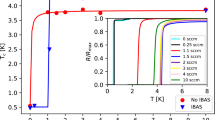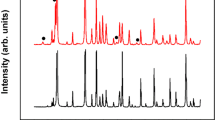Abstract
It may be of interest to record our recent results on the thermionic properties of thoria coatings and of thoria in bulk. In the first experiments, a coating of thoria about 0.1 mm. thick was formed on a tantalum strip by spraying. The spraying suspension was made using an organic binder and solvent, as employed in standard techniques with barium–strontium carbonates. Direct current and pulsed emission were studied in a simple diode the anode of which could be water-cooled. The thoria surface temperature was estimated from pyrometer measurements assuming a spectral emissivity of 0.35 over the temperature range 1,800°–2,100° K.
This is a preview of subscription content, access via your institution
Access options
Subscribe to this journal
Receive 51 print issues and online access
$199.00 per year
only $3.90 per issue
Buy this article
- Purchase on Springer Link
- Instant access to full article PDF
Prices may be subject to local taxes which are calculated during checkout
Similar content being viewed by others
References
Weinreich, Rev. Gen. Elec., 54, 243 (1945).
Author information
Authors and Affiliations
Rights and permissions
About this article
Cite this article
WRIGHT, D. Thermionic Properties of Thoria. Nature 160, 129–130 (1947). https://doi.org/10.1038/160129a0
Issue Date:
DOI: https://doi.org/10.1038/160129a0
Comments
By submitting a comment you agree to abide by our Terms and Community Guidelines. If you find something abusive or that does not comply with our terms or guidelines please flag it as inappropriate.



